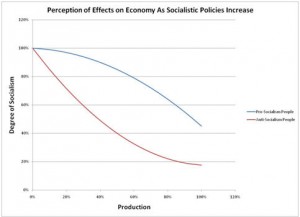This video changed how I view the world. Essentially it served to turn some of my basic assumptions about people on their head. In particular, this video questions whether incentives, in fact, incent. I would not go far as to say it kills the idea (of incentives) completely, but it certainly adds a new twist to it.
Venture Capital Financings per Capita by State
PriceWaterhouseCoopers recently released their Money Tree Report, which among other things provides the dollar amount of venture capital money raised by state. Below is data from this report, but with each state considered on a per capita basis (2012 VC$ / 2010 population). The last column is percentage of the highest per capita rate as a measure of relative activity.
| State | 2012 VC$ | 2010 Pop | Per Cap VC$ | % of Highest |
| MA | 3,126,968,400 | 6,547,629 | 477.57 | 100.0% |
| CA | 14,194,421,800 | 37,253,956 | 381.02 | 79.8% |
| WA | 907,508,100 | 6,724,540 | 134.95 | 28.3% |
| CO | 585,433,300 | 5,029,196 | 116.41 | 24.4% |
| UT | 318,397,200 | 2,763,885 | 115.20 | 24.1% |
| DC | 64,201,200 | 601,723 | 106.70 | 22.3% |
| NY | 1,863,532,100 | 19,378,102 | 96.17 | 20.1% |
| RI | 85,059,100 | 1,052,567 | 80.81 | 16.9% |
| NJ | 444,135,500 | 8,791,894 | 50.52 | 10.6% |
| MD | 284,252,600 | 5,773,552 | 49.23 | 10.3% |
| MN | 253,183,800 | 5,303,925 | 47.74 | 10.0% |
| VA | 372,380,200 | 8,001,024 | 46.54 | 9.7% |
| NH | 60,672,000 | 1,316,470 | 46.09 | 9.7% |
| IL | 570,432,100 | 12,830,632 | 44.46 | 9.3% |
| CT | 157,577,300 | 3,574,097 | 44.09 | 9.2% |
| PA | 520,744,100 | 12,702,379 | 41.00 | 8.6% |
| TX | 934,421,200 | 25,145,561 | 37.16 | 7.8% |
| AZ | 221,938,100 | 6,392,017 | 34.72 | 7.3% |
| OR | 124,267,800 | 3,831,074 | 32.44 | 6.8% |
| GA | 261,840,300 | 9,687,653 | 27.03 | 5.7% |
| OH | 285,750,500 | 11,536,504 | 24.77 | 5.2% |
| MI | 236,805,900 | 9,883,640 | 23.96 | 5.0% |
| NC | 196,918,300 | 9,535,483 | 20.65 | 4.3% |
| NM | 35,732,000 | 2,059,179 | 17.35 | 3.6% |
| WI | 95,311,900 | 5,686,986 | 16.76 | 3.5% |
| KS | 47,201,700 | 2,853,118 | 16.54 | 3.5% |
| TN | 87,160,600 | 6,346,105 | 13.73 | 2.9% |
| IN | 84,161,300 | 6,483,802 | 12.98 | 2.7% |
| FL | 199,110,400 | 18,801,310 | 10.59 | 2.2% |
| DE | 9,489,900 | 897,934 | 10.57 | 2.2% |
| ID | 15,150,000 | 1,567,582 | 9.66 | 2.0% |
| ME | 12,787,200 | 1,328,361 | 9.63 | 2.0% |
| OK | 34,036,000 | 3,751,351 | 9.07 | 1.9% |
| SC | 39,499,900 | 4,625,364 | 8.54 | 1.8% |
| WV | 14,568,000 | 1,852,994 | 7.86 | 1.6% |
| VT | 4,415,000 | 625,741 | 7.06 | 1.5% |
| NE | 10,615,000 | 1,826,341 | 5.81 | 1.2% |
| MT | 5,575,100 | 989,415 | 5.63 | 1.2% |
| KY | 23,543,000 | 4,339,367 | 5.43 | 1.1% |
| AL | 23,106,000 | 4,779,736 | 4.83 | 1.0% |
| ND | 2,400,000 | 672,591 | 3.57 | 0.7% |
| MO | 21,316,000 | 5,988,927 | 3.56 | 0.7% |
| MS | 9,776,000 | 2,967,297 | 3.29 | 0.7% |
| NV | 7,095,100 | 2,700,551 | 2.63 | 0.6% |
| LA | 10,508,400 | 4,533,372 | 2.32 | 0.5% |
| AR | 5,000,000 | 2,915,918 | 1.71 | 0.4% |
| IA | 5,000,000 | 3,046,355 | 1.64 | 0.3% |
| HI | 645,000 | 1,360,301 | 0.47 | 0.1% |
| PR | 100,000 | 3,725,789 | 0.03 | 0.0% |
| SD | – | 814,180 | – | 0.0% |
On Black Swan Probability and Tail Obesity
For a long while now, having watched bubbles form and pop, I have found it frustrating how people pile into assets with straight line trajectories. I first noticed it in the time of the dot-com bubble of the late 1990s. During that time, as I recall, returns in the market were frighteningly close to straight line, not only highly positive, but with a low volatility of returns from month to month.
“If something cannot go on forever, it will stop.”
~ Herbert Stein
The Socialism Paradox
I find myself fascinated how similar people, with similar values, can feel so differently about social engineering. This comes out in political discourse, and certainly is a hot topic today, with those more in favor of socialism, which I’ll refer to in this article as socialism inclined, having dramatically increased momentum for putting their more socialistic policies in place.
I’ve paid attention to this for a while, inquiring of people who feel differently that I (I believe in little or no socialism) why they felt the way that they did. Over time, I’ve come up with a theory, which is that they generally perceive the effects of some socialism differently.Fairly well all people, whether more capitalistic and or more socialism inclined, would agree that an entirely socialist system would result in a drastically smaller, less productive economy, so much so that everyone suffers. Spectacular and catastrophic failures of socialism dot history. The reason for this is human nature; take incentive away from those capable (for whatever reason) of producing and they stop producing, leading toward a subsistence like economy. The reality is that people don’t produce to give; they produce to get.Where those more vs. less socialism inclined begin to disagree is in the effect of a little bit of socialism, frequently referred to as social engineering. The socialism inclined, in the United States generally considered to be most represented by The Democratic Party, believe that there is little if any effect of some socialism. The anti socialism crowd, generally fiscal Republicans (some Republicans, as well as Democrats, vote based on other reasons such as their opinion on abortion, religion, gay rights, etc., and don’t care about or concern themselves with economic policy), instead believe that the effect of a little bit of socialism is immediate and significant. The difference in this perception could be represented graphically as follows:

I personally believe more like the red line, that a little bit of socialism has an immediate and significantly negative impact, and that we would be better off over all with negligible socialism. This is what I refer to as The Socialism Paradox. In the process of trying to help those on the bottom, those in favor of socialism actually instead negatively affect them, as well as everybody else. At least this is what I believe is likely the case.
This is based in part on the way I find things tend to work. In general, it seems that if a lot of something has a given effect, a little will have some, and the incremental effect actually tends to be greater early on than later.
The good news is that we are on the same team, and have the same goal. We all want to go the same direction, and as far as possible. It is simply, to use a football analogy, that one person thinks we should throw a pass, while another thinks we should rush it up the middle; but we all want to get to the goal line. Frankly, given some of the animosity over the past few years, believing this grants me some comfort.
A Plug For My Convictions
Nevertheless, I get the feeling that we are, as a society, losing track of the fact that stuff does not appear out of thin air. You can’t just give someone something without an effect somewhere else. Stimulus, for example, is borrowing. To use an analogy, if you max out your credit cards, you’ll have more stuff in the short term, but you’ll pay for it big time later. Isn’t this essentially the same thing? Worse yet, aren’t we really simply borrowing money that we will not begin to start paying back, if ever, until those in grade school today are in the workforce? Thus, instead of owning up to our failures and enduring some pain, are we not instead saddling these children with debt so that we can avoid pain ourselves (as if they will have no problems of their own to deal with)? Is it not possible that the pendulum could swing too far?
Could The Story of Cain & Abel Be The Story of The Genocide of Neanderthals?
A couple of years back I read a theory in Charles Pellegrino’s book “Ghosts of Vesuvius” that has fascinated me since, that the Biblical story of Cain and Abel is an echo of the genocide of Neanderthals by Homo sapiens.
It is known that Neanderthals and Homo Sapiens lived around the same time. Doesn’t it only seem reasonable that this story may be the story, passed down from fireside to fireside, of the end of neanderthals?
Note the similarity. Homo sapiens were farmers, like Cain, while Neanderthals were herdsman, like Abel. The story, instead of being about how murder first entered the world, might instead be the story of how Homo sapiens dominated by being the variant willing to kill to win.
Other stories in The Bible are widely speculated to be related to historic events. Noah, it is speculated, is the story of flooding of lower populated areas caused by the breaking of ice dams around 10,000 BC, a theory discussed extensively and somewhat persuasively in Graham Hancock’s book “Underworld.” Remember, these were the areas that were populated at the time. People did not have luxury mountain cabins in Aspen back then; they had a dwelling near water. As another example, some of the stories in the passages about Moses are likewise speculated to be related to surrounding and caused by the eruption of Thera.
Thus two of the most prominent stories of the bible, that of Noah’s Ark and of The Exodus, may be stories of some of the biggest events of history, which have simply echoed through time due to the raw impact of the events.
Would not the first genocide also qualify as significant? Isn’t it then reasonable that this story of Cain and Abel could also be the story of one of history’s most significant events?
Originally published 3/27/09 in Science 2.0.
